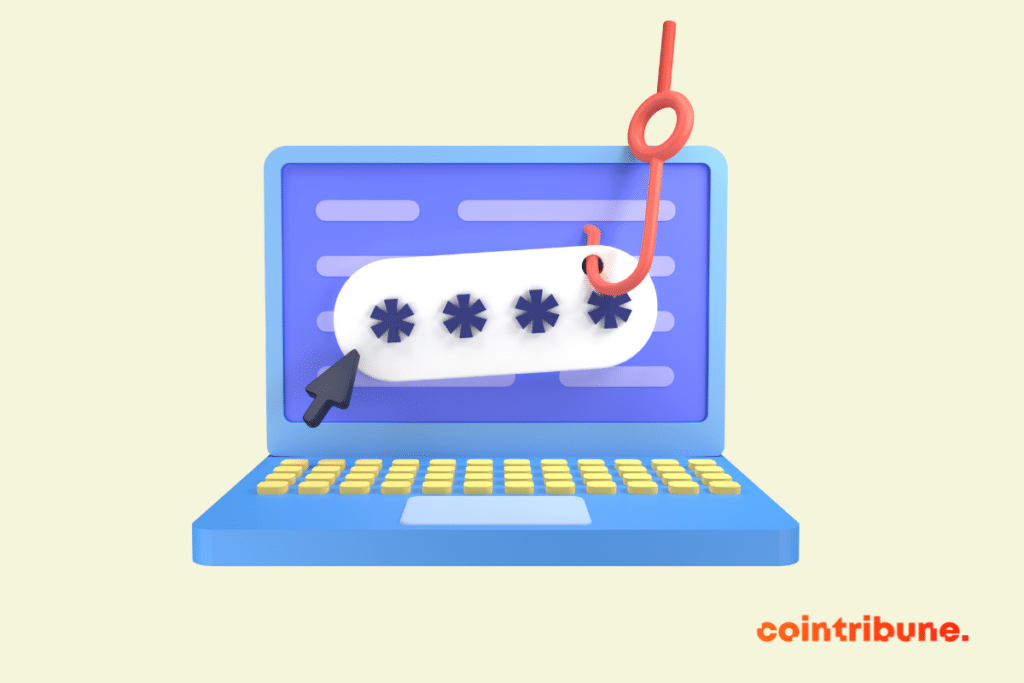Bitcoin Security: Watch Out for Phishing Scams!
In the universe of cryptocurrencies, security is of paramount importance for investors, especially when they expose themselves to Bitcoin. This article examines a recurring and hazardous issue for users of these assets: phishing scams, also known as phishing. We will explain how to identify attempts of this Bitcoin scam, and provide protection tips. You will also receive some recommendations regarding measures to take in case you fall victim to this type of attack.

Understanding Phishing Related to Bitcoin
Phishing is a technique used by cybercriminals to steal sensitive information, such as passwords or personal data. In the context of Bitcoin and cryptocurrencies, the stakes are even higher, as transactions are irreversible and funds can be quickly transferred to anonymous wallets.
What is Phishing?
Phishing, or phishing in English, is a technique of online fraud that aims to trick internet users into extracting sensitive information or access data to their account. Cybercriminals send fraudulent messages, usually via email, posing as a legitimate entity, such as a bank, a cryptocurrency exchange, or a social network.
Common Phishing Methods
- Sending emails imitating those of a recognized exchange or crypto service;
- Creating fake websites that resemble an exchange or a cryptocurrency wallet;
- Identity theft on social networks to encourage victims to disclose their sensitive information.
Targets of Phishing in the Bitcoin Domain
- Cryptocurrency users: wallet holders, investors, traders;
- Cryptocurrency exchanges: to attempt to access user accounts and steal their funds;
- Companies and organizations: to steal sensitive information, funds, or personal data from customers.
How to Recognize a Phishing Attempt?
The ability to identify the signals of a phishing attempt is the first step to avoid falling into the trap set by cybercriminals. These will help you thwart attacks from these hackers and preserve the security of your bitcoins and other cryptocurrencies. Here are some elements that can raise your awareness and help you detect a phishing attempt:
Suspicious Email Addresses
Cybercriminals often use email addresses that resemble those of legitimate organizations, but with slight differences. Be vigilant and always check the sender’s address before clicking on a link or opening an attachment.
Fraudulent URLs and Websites
Fake websites often mimic the appearance of legitimate sites, but have differences in their URL. Carefully check the website’s address and make sure it matches that of the official platform.
Urgent Messages and Calls to Action
Phishing attempts often play on urgency to prompt victims to act quickly without thinking. Be cautious of messages that ask you to act immediately, especially if they concern the security of your crypto assets.

Protecting Your Assets Against Phishing
In addition to identifying these signals, you need to implement security measures to protect yourself against phishing attempts. Adopting good security practices will allow you to protect your personal information and be less vulnerable to attacks from hackers. Here are some recommendations to achieve this:
Use Complex and Unique Passwords
You should create robust passwords for your online accounts and cryptocurrency wallets. Feel free to use combinations of uppercase and lowercase letters, numbers, and special characters for this purpose. Furthermore, it is strongly discouraged to use the same password for different services.
Regularly Update Your Software and Applications
Frequent updates of your operating systems, browsers, and applications are essential to take advantage of the latest security improvements. This helps you reduce potential vulnerabilities and ensure optimal protection of your data and crypto assets.
Enable Two-Factor Authentication (2FA)
Do not forget to enable two-factor authentication on all your online accounts and cryptocurrency wallets. This security measure enhances your protection by adding an additional layer of identification to the login process. It then becomes more difficult for hackers to access your sensitive information and crypto funds.
What to Do in Case of Successful Phishing?
If you become a victim of a phishing attempt targeting your bitcoins, you must act quickly to minimize the consequences of this attack. Here are some actions to take immediately if you suspect a successful phishing attack:
Change Passwords and Secure Accounts
You must change the passwords of all compromised accounts, including those of associated services. Don’t forget to enable two-factor authentication if it has not been done already to strengthen your account security.
Report the Incident to the Relevant Authorities
Inform the relevant authorities, such as the police or consumer protection services, about the phishing attack. In France, you can report the incident on the site internet-signalement.gouv.fr.
Monitor Your Accounts and Online Activities
You should remain vigilant and closely monitor your bank accounts, cryptocurrency wallets, and online activities to spot any suspicious activity. If you notice unauthorized transactions, immediately contact the relevant platforms to suspend these transactions and safeguard your crypto assets.
Conclusion
In conclusion, security is a determining factor in the cryptocurrency ecosystem. Indeed, it helps to prevent losses related to phishing attempts and scams such as Bitcoin Ponzi schemes. Therefore, you must be able to identify the alarm signals of these scams, adopt good security practices, and know how to react in case of a successful attack. Caution and vigilance are the best assets to protect your valuable crypto assets and maintain your peace of mind in this constantly evolving environment.
Maximize your Cointribune experience with our "Read to Earn" program! For every article you read, earn points and access exclusive rewards. Sign up now and start earning benefits.
The Cointribune editorial team unites its voices to address topics related to cryptocurrencies, investment, the metaverse, and NFTs, while striving to answer your questions as best as possible.
The views, thoughts, and opinions expressed in this article belong solely to the author, and should not be taken as investment advice. Do your own research before taking any investment decisions.